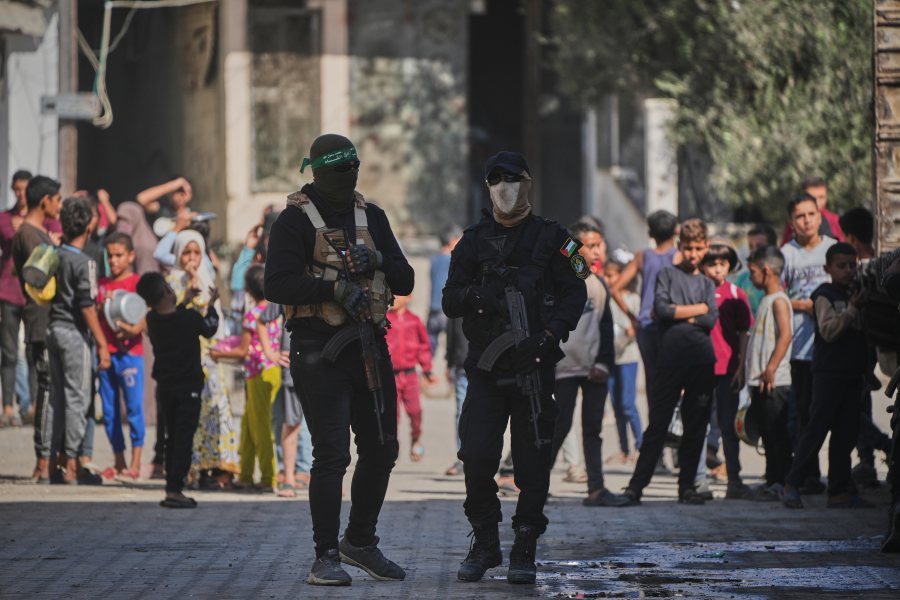World
Slow Return of Hostage Bodies Threatens Gaza Ceasefire

The ongoing conflict between Israel and Hamas has taken a new emotional toll as the slow return of hostage bodies threatens the fragile ceasefire established on October 10, 2023. Families of Israeli hostages are grappling with the anguish of uncertainty as they await the remains of their loved ones from Gaza. The release of a single body on Monday offered a glimmer of hope for 13 families, but it quickly turned to despair when news emerged that only partial remains were recovered from a previous release.
The ceasefire, negotiated with U.S. involvement, has been under strain, particularly as Israeli Prime Minister Benjamin Netanyahu ordered renewed military actions in Gaza. This escalation prompted Hamas to announce delays in returning additional bodies, further complicating the situation for grieving families. As of now, the return of remains remains a critical issue, particularly given the cultural importance of proper burial practices in Israel, which are deeply rooted in religious beliefs.
Families are navigating a painful waiting game, with many expressing a desperate need for closure. Orna Neutra, mother of Omer Neutra, an Israeli-American soldier who was killed during the conflict and whose body was taken by Hamas, articulated the profound emotional toll of this ordeal. “This is my son,” she stated in Tel Aviv. “We need that concreteness.”
The ceasefire allowed for the release of 20 living hostages in exchange for nearly 2,000 Palestinian prisoners. In addition, Hamas returned the remains of 15 hostages. However, the militant group claims that many bodies remain buried under rubble, complicating recovery operations. Israel has accused Hamas of delaying the process and has threatened to resume military operations if all remains are not returned.
Hamas has reportedly expanded its search efforts, with assistance from Egyptian experts and heavy machinery. Meanwhile, families in Gaza face their own struggles, attempting to identify remains returned by Israel. Under the ceasefire agreement, Israel committed to return 15 deceased Palestinians for each Israeli body returned, yet identification remains a significant challenge, with many bodies appearing to be fighters.
The emotional impact on families extends beyond simple logistics. For those who have received the remains of their loved ones, Dr. Einat Yehene, head of rehabilitation for the Hostages Families Forum, emphasizes the importance of spending time with the bodies. “Some came back recently with clothing. Some were only bones. Some were only parts of remains, fragmented pieces. It’s very devastating,” she noted, highlighting the unique grief experienced by families who have been unable to properly mourn.
The return of bodies is not merely a matter of logistics; it is a vital component of the grieving process. Yehene describes this “disrupted bereavement” as a state where families are frozen in grief, waiting for closure. Receiving the remains provides a sense of concreteness and allows families to say goodbye, which is essential for healing.
In Israel, cultural and religious practices dictate a strong expectation for prompt burial. This urgency is echoed in both Jewish and Islamic traditions, which stress the importance of burying the deceased as soon as possible. The Neutra family, for instance, has advocated tirelessly for Omer’s return, making numerous trips to Washington and participating in protests.
As the conflict continues and the situation evolves, the families await the return of their loved ones. Orna Neutra shares a sentiment that resonates with many: “You crave this closure.” The slow pace of remains being returned has become a new form of suffering for those already enduring profound loss.
In this environment of uncertainty, the collective grief of families on both sides serves as a stark reminder of the human cost of war. As individuals continue to search for their loved ones, the hope for peace and resolution hangs in the balance, intertwined with the emotional needs of those waiting to lay their relatives to rest.
-

 Science2 weeks ago
Science2 weeks agoIROS 2025 to Showcase Cutting-Edge Robotics Innovations in China
-

 Politics2 weeks ago
Politics2 weeks agoJudge Considers Dismissal of Chelsea Housing Case Citing AI Flaws
-

 World2 weeks ago
World2 weeks agoBravo Company Veterans Honored with Bronze Medals After 56 Years
-

 Lifestyle2 weeks ago
Lifestyle2 weeks agoStone Island’s Logo Worn by Extremists Sparks Brand Dilemma
-

 Top Stories2 weeks ago
Top Stories2 weeks agoIndonesia Suspends 27,000 Bank Accounts in Online Gambling Crackdown
-

 Health2 weeks ago
Health2 weeks agoStartup Liberate Bio Secures $31 Million for Next-Gen Therapies
-

 Sports2 weeks ago
Sports2 weeks agoMel Kiper Jr. Reveals Top 25 Prospects for 2026 NFL Draft
-

 Health2 weeks ago
Health2 weeks agoTop Hyaluronic Acid Serums for Radiant Skin in 2025
-

 World2 weeks ago
World2 weeks agoHoneywell Predicts Record Demand for Business Jets Over Next Decade
-

 Sports2 weeks ago
Sports2 weeks agoYamamoto’s Mastery Leads Dodgers to 5-1 Victory in NLCS Game 2
-

 Politics2 weeks ago
Politics2 weeks agoNew Jersey Voters Urged to Register Ahead of November Election
-

 Lifestyle2 weeks ago
Lifestyle2 weeks agoMary Morgan Jackson Crowned Little Miss National Peanut Festival 2025









